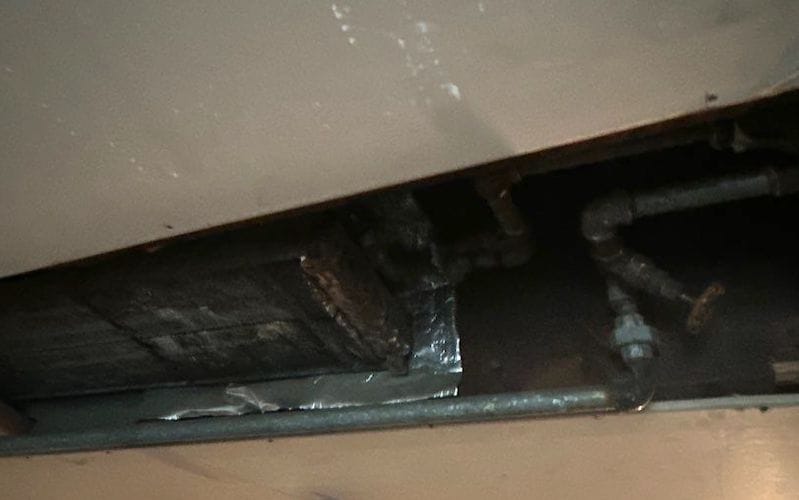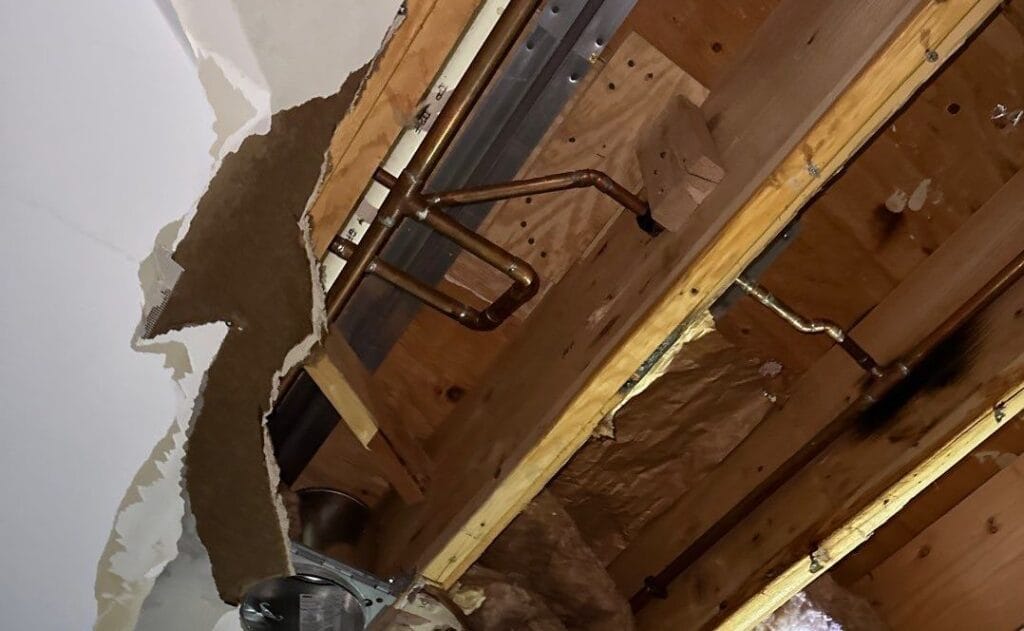Some years, it seems like Chicago winters are the coldest in the nation. We break records, shovel snow and shiver through historic polar vortexes.
Residents across the city take it all in stride, but we never get used to the freezing effect it has on our plumbing.
Are you ready to deal with frozen pipes when they break and flood the house?
This time of year, our teams stay busy helping Chicago residents recover from frozen water pipes that have burst in their homes and businesses.
We want you to stay safe all winter, so we’ve put together this guide covering everything you need to know about frozen pipes.
Let’s get started.
At What Temperature Do Pipes Freeze in Chicago?

In most cases, water pipes freeze when the temperature falls to 20 degrees Fahrenheit.
However, a combination of strong winds and high wintertime humidity can cause pipes to freeze and burst at warmer temperatures.
It’s a common problem for property owners all across Chicago. Our winters can roar in on winds howling across Lake Michigan. They can quietly send overnight temperatures below zero.
Freezing precipitation buries us under lake effect snow. Regardless of the conditions, this time of year takes a toll on pipes inside and outside homes and businesses.
The city’s average winter forecast tells the story. By the middle of November, we’re dealing with freezing temperatures in Chicago. By December and through late February, the mercury dips well below 32 degrees Fahrenheit.
It plunges into the 20-degree range often enough to freeze and burst pipes all across the city.
What Causes Water Pipes to Freeze in Chicago?
The short answer seems simple enough. Extreme cold causes pipes to freeze and burst. However, if that were the only reason, everyone’s pipes would burst every winter.
When water freezes inside your home’s pipes, it expands. The process happens on a molecular level, exerting enormous pressure on the pipes.
The tremendous force transfers pressure on unfrozen water downstream from the frozen point to the end faucet.
A pipe burst usually occurs somewhere between the frozen blockage and the faucet.
We typically find ruptures on lengths of pipe where little or no ice is apparent. It can happen quickly too, in as little as six hours.
These are the three most common reasons pipes freeze and burst during Chicago winters.
- Inadequate Insulation – Old, worn or water-damaged insulation can’t protect pipes from freezing temperatures.
- Severe Temperature Drops – A sudden temperature drop into the 20s can freeze pipes in just six hours.
- Sustained Freezes – Consecutive days of frigid temperatures can push cold air into protected areas and freeze pipes.
- Low Interior Temperatures – Broken furnaces or power outages can result in dangerously cold interior temperatures.
Where Are Frozen Pipes Most Commonly Located?

The same cold weather that freezes basement pipes is also the reason so many Chicago homes are built with this feature.
When moisture in the ground freezes, it expands, and that action can damage a concrete slab foundation.
A basement can withstand seasonal expansions and contractions, but it’s difficult to insulate the area against frigid temperatures.
Water pipes in attics and garages are also prone to freezing. Frozen pipe bursts in crawl spaces are another problem area residents deal with every winter.
How Do I Know If I Have Frozen Pipes?
When frozen pipes burst and flood the house, it’s obvious right away, but pipes don’t always rupture when they freeze.
If you think your pipes are frozen, look for these signs.
- No water running from an open tap
- Extremely cold pipe surfaces
- Frost on pipes under cabinets or in the basement
- Odd smells around drains and faucets
- Wet spots on ceilings or walls adjacent to pipes
- Fluctuating or unexpectedly low water pressure
- Sudden loud noises from behind walls or up in ceilings
How Do I Unfreeze My Water Pipes?
Frozen water pipes will eventually thaw, but a hard freeze here in Chicago can last for several days. When your pipes freeze, water pressure inside the system can exceed 40,000 psi, so you may not want to wait.
Depending on the location of the pipe, you can usually thaw it with a heat lamp or hair dryer. Never use an open flame on frozen pipes. If you see cracks or leaks, call a water damage professional right away.
What Should I Do If a Water Pipe Bursts in My Chicago Home?
The damage from a burst water pipe can quickly spread behind walls, under the floor, and even into ceilings on lower floors. You want to take care of the situation as quickly as possible, and you need to stay safe too.
It’s best to deal with a burst pipe by following these four steps.
1. Turn Off the Water
Locate the main valve to your water supply, and turn it off. This reduces the damage that can occur once the pipes begin to thaw.
If you need to contact the city, you can reach Chicago’s Department of Water Management by calling 311.
2. Be Careful Around Appliances
Don’t try to use or unplug appliances in areas where floors are wet. Stay safe by turning off the breakers in affected rooms.
In case of extensive flooding, shut down your home’s electricity with the main switch in the breaker box.
3. Call ServiceMaster Restoration by Zaba
Even a small pipe burst can result in hidden problems behind walls and under floors. You can take care of minor leaks, but you can’t always be sure about a frozen pipe’s integrity once it thaws.
Call the best water damage restoration service in Chicago: ServiceMaster Restoration by Zaba — our team expertly handles burst pipe water damage cleanup: (773) 647-1985
4. Document the Damage
In most cases, homeowners insurance covers water damage caused by frozen pipes that burst.
Call your agent, and explain the situation. Document your losses by taking pictures of wet walls, floors, furniture and personal items.
Your water damage contractor can help by providing written documentation detailing repairs and restoration work. He or she can also help you navigate the insurance claims process.
How Can I Prevent Frozen Pipes?

Simple DIY insulation strategies keep pipes from freezing, and that can save you from dealing with property damage after a pipe burst.
Add extra layers of protection by backing up your work with these frozen pipe prevention tips:
- Inspect your home’s plumbing for leaks or weak spots before the freeze hits.
- Keep the thermostat set to 70 degrees Fahrenheit when you’re not home.
- Make sure weather stripping and seals are solid around windows and doors.
- Let kitchen and bath faucets drip during a hard freeze.
- Circulate warm air through lower cabinets by leaving them open.
- Insulate vulnerable attic and basement pipes with heat tape.
- If the water heater is in the garage or basement, insulate its hot and cold water pipes.
- Insulate any pipes in the garage, and make sure the garage door stays securely shut.
- Protect exterior spigots with insulated faucet covers.
- Shut down and drain outdoor plumbing to lawn sprinkler systems and pools.
- If you need to be away for more than 24 hours, turn off your home’s main water supply.
What Is the Average Cost of Frozen Pipe Repair in Chicago, IL?
The cost of repairing a frozen burst pipe here in Chicago depends on several factors, including pipe location and the extent of damage.
In most cases, repair costs range between $200 and $500. However, big jobs can run as much as $1,000 to $2,000.
A full-service water damage professional handles interior cleanup and restoration repairs caused by a burst pipe.
You can often save money by letting a company take care of the entire job.
Dealing With Frozen Burst Pipes in Chicago, IL? Turn to ServiceMaster by Zaba
Even the best pipe protection can be undone by frigid winter weather. If it happens to you, call us right away. Our technicians clean up the mess and restore your home to its pre-damage condition.
We’re here for you with a comprehensive line of services, and we’re available for emergencies 24/7. When you need Chicago’s most trusted water damage pros, call ServiceMaster by Zaba: 773-647-1985